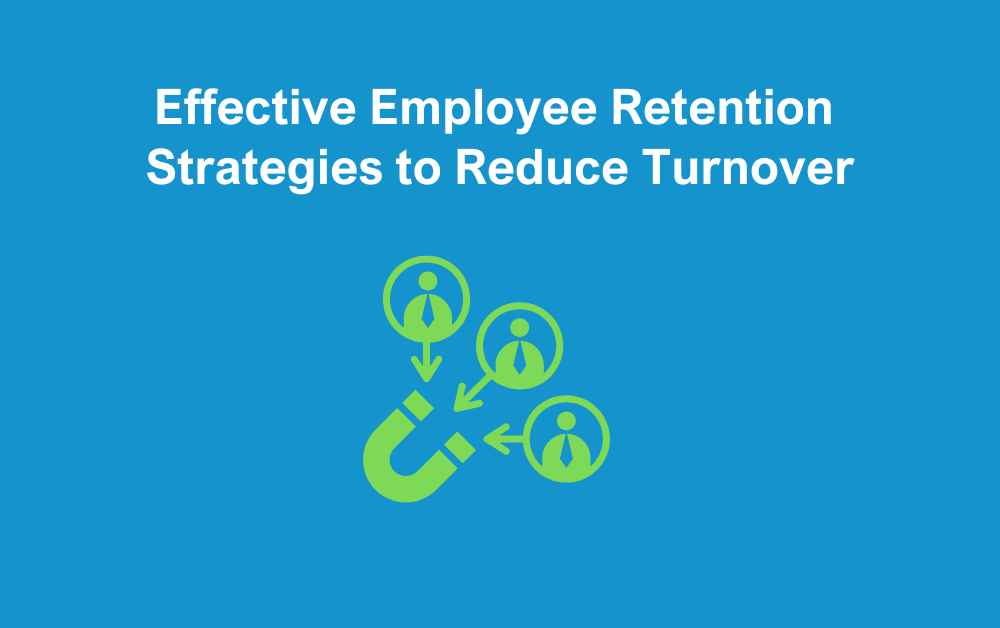In today’s competitive job market, businesses of all sizes face the growing challenge of holding onto their top talent. High employee turnover not only disrupts productivity but also comes with substantial recruitment and training costs. That’s why developing strong employee retention strategies is crucial for long-term business success.
In this blog, we’ll explore practical, effective and sustainable employee retention strategies that help reduce staff turnover and build a loyal, engaged workforce.
Why Are Employee Retention Strategies Important?
When employees leave, businesses don’t just lose people—they lose valuable knowledge, experience and sometimes, client relationships. Replacing employees can be expensive and time-consuming, which is why proactive employee retention strategies are essential.
Strong retention strategies help:
- Increase employee engagement
- Improve morale and team togetherness
- Reduce recruitment costs
- Strengthen company culture
- Boost productivity and service continuity
Top Employee Retention Strategies to Reduce Turnover
1. Offer Competitive Salaries and Benefits
Fair pay remains one of the most significant factors in employee satisfaction. Conduct regular salary benchmarking to ensure your packages are in line with industry standards. Don’t underestimate the value of benefits such as flexible working, private healthcare and additional annual leave.
2. Provide Opportunities for Career Development
Employees are more likely to stay with companies that invest in their growth. Offer training, mentorship, and clear progression paths to help team members develop their careers. This shows you’re committed to their future, not just their current role.
3. Create a Positive Company Culture
A supportive and inclusive workplace culture can make a massive difference in retention. This is one of the most effective employee retention strategies. Encourage open communication, recognise achievements, and foster a sense of belonging. When employees feel valued and included, they’re less likely to seek opportunities elsewhere.
4. Encourage Work-Life Balance
Burnout is a major cause of employee turnover. Promote flexible working hours, remote working options, and reasonable workloads. A good work-life balance helps employees maintain their wellbeing, which ultimately boosts loyalty and long-term retention.
5. Prioritise Teamwork and Collaboration
Strong teamwork can significantly enhance employee satisfaction and retention. When individuals feel part of a cohesive, collaborative team, they’re more likely to stay loyal to the organisation. Encourage team-building activities, cross-functional projects, and open lines of communication to create a supportive, united working environment.
Effective teamwork builds trust, improves problem-solving, and fosters a sense of shared purpose—all of which are powerful drivers of long-term engagement. As part of your employee retention strategies, prioritising collaboration can help develop a more resilient and productive workforce.
6. Conduct Regular Employee Feedback Sessions
Listening to your employees is one of the simplest yet most effective strategies. Regular feedback sessions—whether through surveys, one-to-ones or suggestion boxes—allow you to identify issues early and respond appropriately.
7. Recognise and Reward Contributions
A simple thank you can go a long way. Implement employee recognition programmes to reward hard work, whether through bonuses, team shout-outs or awards. Recognition increases job satisfaction and helps employees feel appreciated.
8. Strengthen Onboarding Processes
The first few months are critical in an employee’s journey. A structured, welcoming onboarding process helps new hires settle in faster, feel supported, and understand their role within the business. This is a key element in long-term employee retention.
9. Health & Wellbeing Program
Employee health and wellbeing is essential as part of your employee retention strategies. Consider implementing wellness programmes that focus on:
- Physical Health: Offer gym memberships, wellness challenges, or on-site fitness facilities to encourage a healthy lifestyle.
- Mental Health: Provide access to counselling services, stress management workshops, or flexible work hours to alleviate stress and support mental wellbeing.
- Work-Life Integration: Support work-life integration by offering benefits like remote work options, family-friendly policies, and childcare services.
Tailoring Employee Retention Strategies to Your Business
No two businesses are the same, so it’s important to tailor your employee retention strategies to your unique workplace culture, industry, and team needs. Regularly review your approach, analyse turnover trends, and adapt your plans accordingly.
How The HR Booth Can Help
At The HR Booth, we understand that employee retention is about more than just keeping people—it’s about building a strong, motivated workforce that drives your business forward. Our team of HR experts works closely with you to develop tailored strategies that align with your company goals and culture.
We can help you:
- Identify the root causes of staff turnover
- Build a positive employee experience from onboarding to progression
- Create effective reward and recognition programmes
- Develop leadership and management capability
- Support employee engagement and communication
- Provide ongoing HR support and advice whenever you need it
Whether you’re a small business or growing organisation, our flexible HR consultancy service is designed to support you every step of the way.
Final Thoughts
Reducing turnover doesn’t happen overnight, but with the right employee retention strategies, you can create an environment where people feel motivated, supported, and eager to stay. Investing in your people isn’t just good for morale—it’s good for your bottom line.
Ready to improve employee retention in your business?
Contact us today to discover how we can help you create a workplace where people thrive.







